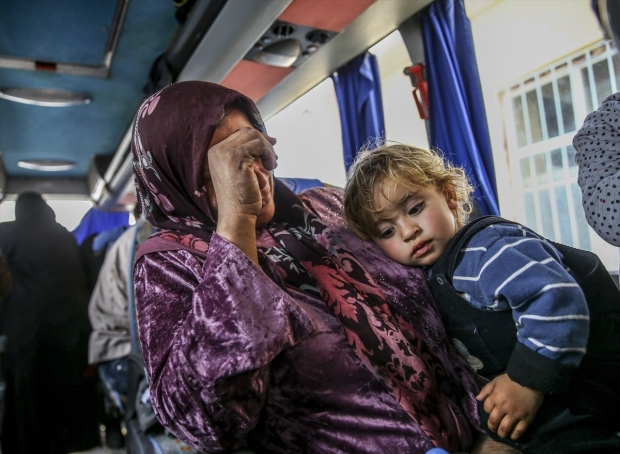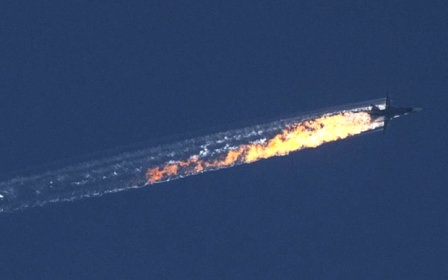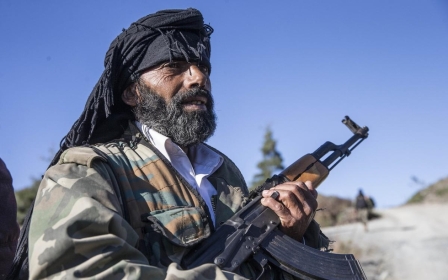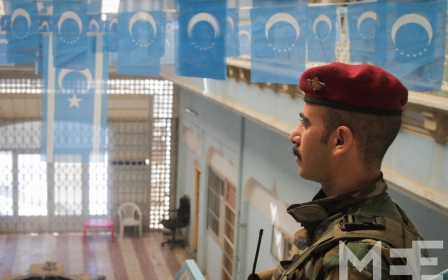Turks head to Syria to defend Turkmen 'brothers'
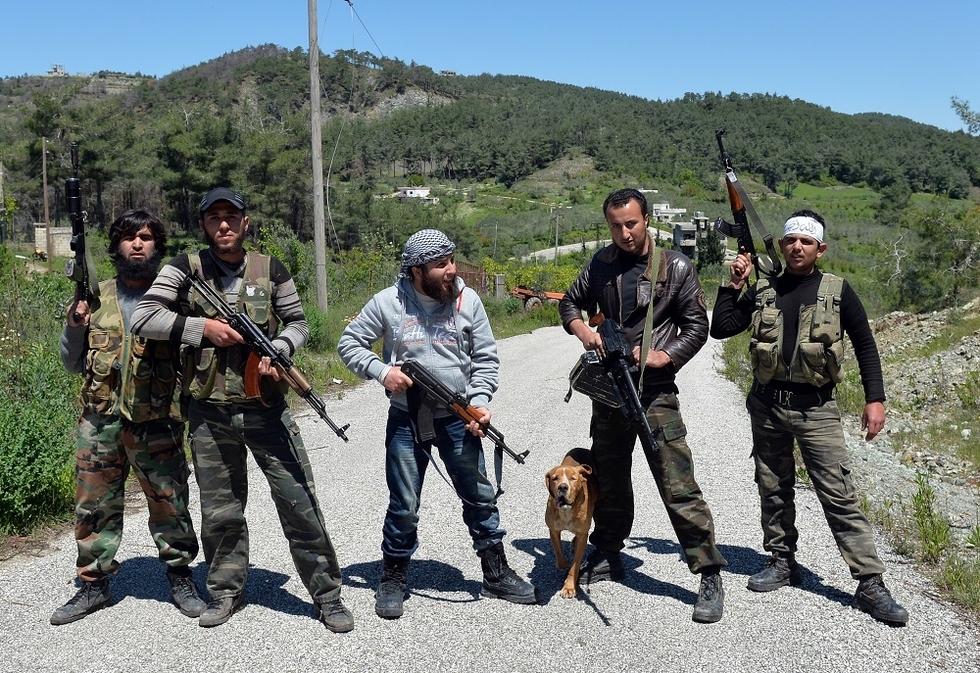
ISTANBUL, Turkey - Tens of thousands of Turks have expressed a desire to cross the border into Syria and join Turkmen rebels fighting government and Russian forces in Syria, with hundreds already believed to have joined the battle.
According to aid groups who have been funnelling aid to rebel areas, scores of potential recruits now want to go to the Turkmen Mountain, a border area in Syria's Latakia province, to help native Turkmen under growing threat from Russian air strikes and government advances.
Between 250 and 500 Turkish citizens have already gone to Latakia to join mostly Turkmen rebels, with casualties on the rise.
While thousands of Turkish citizens are estimated to be already fighting in Syria with groups such as the Islamic State (IS) or the al-Nusra Front, those heading towards Turkmen areas are drawn by a mix of nationalist, ethnic, and religious sympathy for the minority, says a group sending aid to the region and experts on fighters in Syria.
Right-wing groups like Alperen Ocaklari and Ulku Ocaklari - often called the Grey Wolves - and opposition parties including the Nationalist Movement Party (MHP), say the Russian bombing of Turkmen areas has ignited nationalist fervour in Turkey.
Kursat Mican says he has been busy fielding phone calls from potential recruits since 24 November when Turkey shot down a Russian jet over Turkmen Mountain. He is the Istanbul chairman of Alperen Ocaklari, a cultural and political organisation founded by right-wing religious nationalists that has been delivering aid to the Turkmen for nearly two years.
“They are calling me to ask how they can go join the Turkmen [rebels],” Mican told MEE in the group's Uskudar office, seated beside a mural of Ottoman Sultan Mehmet Fatih entering Constantinople in 1453.
“We had 12,000 people call us to go [join the rebels], then we stopped counting.
“We tell them 'we cannot take you, but if you want to go, we will tell you where to show up, and you can go on your own.' If someone actually organises things, I think 10,000 people would go to Syria,” he added.
Mican says the Russian air strikes were part of a “kind of genocide” aimed at the Turkmen. His group is just one of several organisations now waging an awareness campaign about the battle in the Turkmen Mountain.
Mehmet, a Turk who has fought with the Turkmen several times, told MEE that the situation in northern Turkmen Mountain area was "terrible".
“There are only a few villages left [controlled by the rebels], and we are surrounded, but God willing, we have enough fighters to stop the Russian advance,” he said.
“There is no Daesh or Nusra [there], only FSA,” he said. “So why is Russia constantly dropping bombs there? Obviously, it’s a war, they want a war with Turkey, and they want to [take the area] so they can bomb Turkey.”
Russia has conducted more than 500 air strikes in the Turkmen Mountain area since September, which Turkish officials say has forced 10,000 Turkmen to flee across the border.
Only three of more than 40 villages are still controlled by a force of around 2,000 Turkmen, according to Tariq Solu, vice-chairman of the Syrian Turkmen National Movement Party, one of several Syrian opposition groups.
Ethnic Turkmen claimed their community numbered up to 3.5 million before the Syria war - although other estimates suggest far fewer. The minority settled in the region when it was under the Ottoman Empire, and is perhaps the only group inside Syria that enjoys widespread sympathy in Turkey.
Prime Minister Ahmet Davutoglu has called the Turkmen “our siblings who have lived there for centuries,” and accused Moscow of “trying to ethnically cleanse northern Latakia”.
A PR campaign to expose a ‘genocide’
Leaders from largely secular groups, such as the far-right Ulku Ocaklari, and politicians from the right-wing political party the MHP post daily on their Twitter streams and Facebook pages, posing in military fatigues for photos in the Turkmen Mountain, surrounded by armed rebels, defiant fingers raised to the sky in nationalist gestures.
On 29 January, for instance, Ulku Ocaklari shared photos of the aftermath of alleged Russian air strikes on a camp for internally displaced people in Yamadi, just inside Syrian territory.
“A massacre is happening in Yamadi camp, when will you raise your voice for our Turkmen brothers?” the caption read.
The bombing, which activists say involved cluster munitions, is the fourth such attack in Yamadi since November.
Turkish aid workers have said the Russian jet shot down on 24 November may have been preparing for another such bombing. The Russians deny that they are hitting civilian areas and say they are hitting “terrorist” targets.
“Before [the Russian jet was downed], there were only a handful of organisations helping us,” Mican said. “Now, almost everyone is calling, religious groups, Kurdish groups, Arabs, right and left-wing groups.”
“We have relations with the Turkmen for a thousand years,” Mican said. “What right does Russia have to enter a war a thousand kilometres away from them? People heard this, they heard how Russia shows no mercy, and they felt mercy in their own hearts and wanted to help. They cannot stand by and not help.”
MHP members have called the battle another “Gallipoli,” referring to the 1915-16 campaign that ended with Ottoman troops defeating European powers, sparking the rise of a Turkish Republic.
Groups of political leaders have staged defiant visits to the border, walking hand in hand with Turkmen and Arab rebels. In scenes reminiscent of Kurdish supporters watching the battle for Kobane, they stand on hill tops pointing in the distance to Russian air strikes.
Casualty figures on the rise
The deaths of 17 Turks in Turkmen areas have been publicly acknowledged and their burials having the air of state funerals in cities like Istanbul.
In January, thousands attended the funeral of Ibrahim Kucuk, the deputy chairman of a local MHP office who was killed fighting alongside rebels in the Turkmen Mountain.
Among the mourners was Alparslan Celik, a Turkish national and son of a former MHP mayor, who claims to have killed a Russian pilot that ejected after his plane was shot down by Turkey on 24 November.
“I come and go. I'm here for the funeral. I'll go back,” Celik said at the funeral.
In subsequent interviews, he said he had been fighting in Syria for two years. This drew the ire of Russian officials, who said his appearances were “surprising and outrageous,” and called on Ankara to investigate “a national of their country who openly confessed to an international crime”.
Omer Behram Ozdemir, a researcher at Sakarya University who focuses on the Syrian war, told MEE that hundreds of Turks were probably fighting in the Turkmen Mountain, but some may not be engaged in active combat. Nevertheless, he said, the battle there has had grave domestic implications.
Ozdemir said Turks had participated in foreign wars in the past, such as the 1990s Balkan wars and the Soviet invasion of Afghanistan, but the war in Syria was directly linked with domestic politics.
"Individuals who were joining the fight against Serbians or [Soviets] had some kind of sympathy from mostly the conservative people in the Turkish street. [The] Syrian war is different. It directly affects Turkey.”
Yet the impact these new arrivals might have is disputed. Despite the fervour among Turks over Latakia, the battle for Aleppo is still the foremost priority for rebels, says Firas Pasa, the head of the Muntasir Billah Brigade of about 350 fighters, 170 of them ethnic Turkmen.
Pasa, who regularly appears on Turkish television to talk about the Turkmen minority, told MEE his group had received aid from groups like Ulku Ocaklari and Alparan Ocaklari, but that no Turkish nationalists were taking part in their battle in Aleppo.
“The Russians are bombing us day and night,” he said. “If there were no Russian planes, there would be no Assad today. I wish Turkey gave us weapons against the aircraft, but all we have are ground to ground missiles.”
Middle East Eye propose une couverture et une analyse indépendantes et incomparables du Moyen-Orient, de l’Afrique du Nord et d’autres régions du monde. Pour en savoir plus sur la reprise de ce contenu et les frais qui s’appliquent, veuillez remplir ce formulaire [en anglais]. Pour en savoir plus sur MEE, cliquez ici [en anglais].


